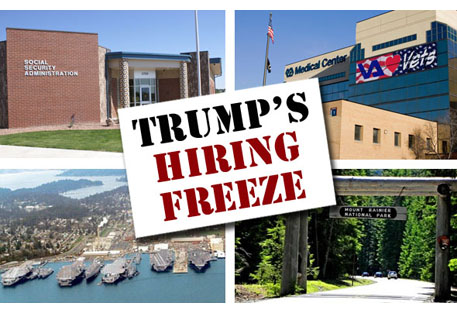NATIONAL
Trump’s federal hiring freeze is killing jobs, hurting vets

1. This plan takes jobs away from Americans. Rather than bringing jobs back to America, eliminating federal government jobs creates a shortage of good jobs, setting back this administration’s stated goals of creating millions of jobs.
2. More than 85% of federal employees live outside Washington, D.C., so this won’t “drain the swamp” — it will hit job markets around the country.
3. The plan disproportionately affects veterans, since the government hires more veterans than any other employer. President Trump is eliminating jobs for those who have served our country. This also creates obstacles between veterans leaving the military and achieving gainful employment, a key part of helping them transition back to civilian life.
4. Some 200,000 federal employees leave the workforce each year. Not replacing them will devastate the work they do and the services they provide to the American people. It will mean longer lines at Social Security offices, fewer workplace safety inspections, less oversight of environmental polluters, and greater risk to our nation’s food supply and clean water systems.
5. The number of federal employees has been frozen at about 2 million for the past 50 years, while the U.S. population has increased by 127 million (from 197 million to 324 million). The use of private contractors, though, has exploded. Contractors are two to three times more costly than the federal employees they replace, on average. If President Trump really wants to drain the swamp, there are at least twice as many contractors as there are civil service workers.
6. The hiring freeze excludes the military and positions vital to national security or public safety. (Although the U.S. Naval Institute reports that the freeze “applies to all Navy shipyards and repair facilities,” including the Puget Sound Naval Shipyard in Bremerton, despite this exemption.) That means the hiring freeze will disproportionately affect domestic programs, many of which already have endured severe budget cuts.
At this point, we have to ask why supporters of this plan don’t want Americans to work, since that seems to be the primary impact of this approach.
Most of this report is cross-posted from AFL-CIO Now.